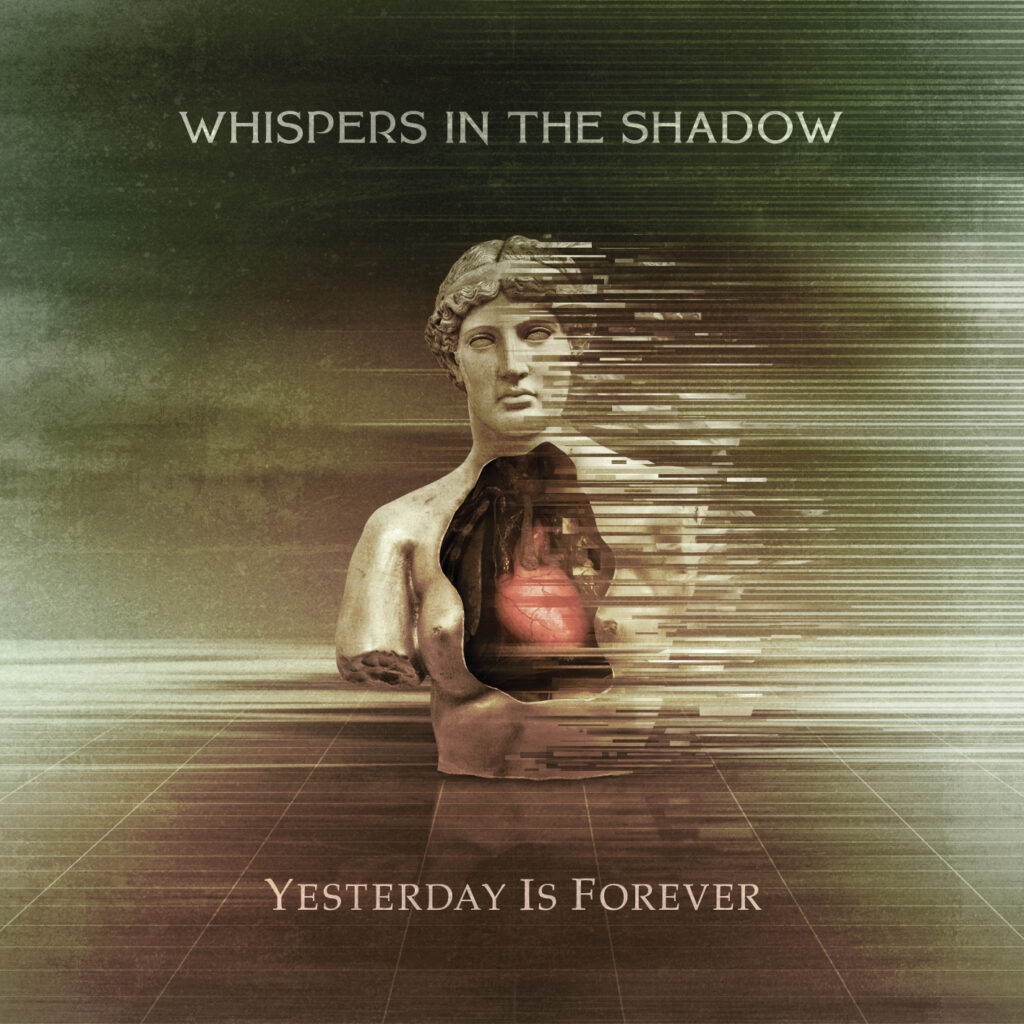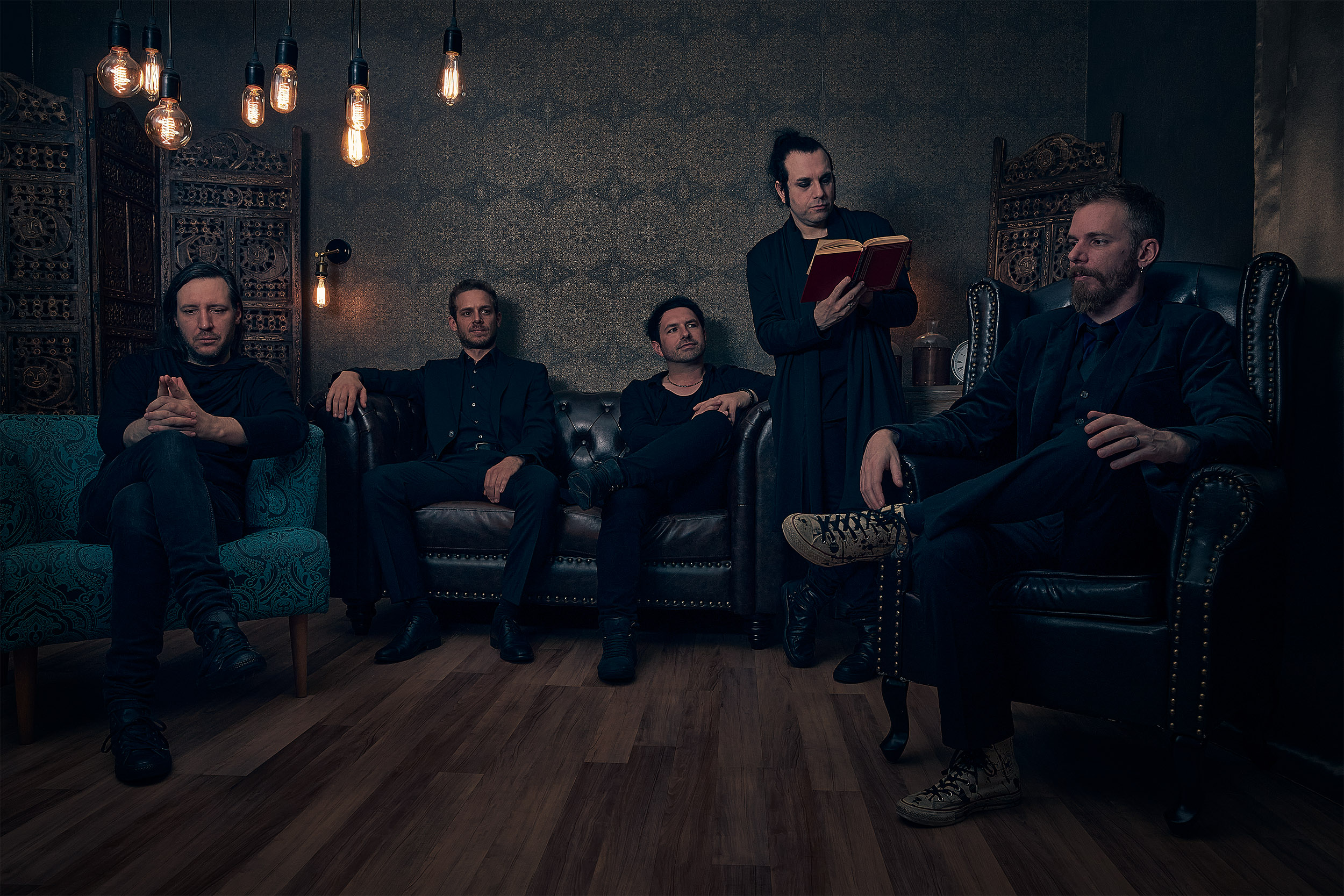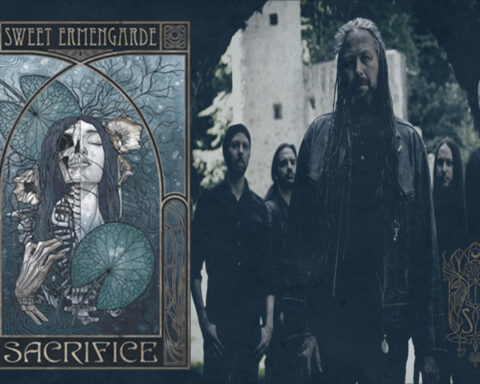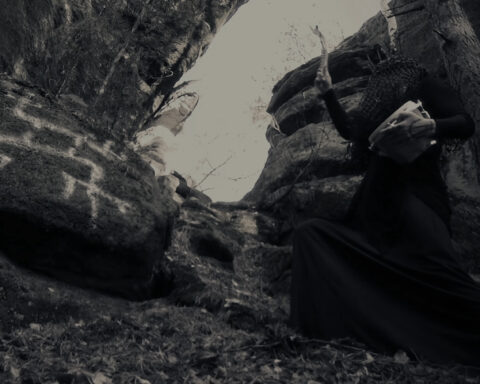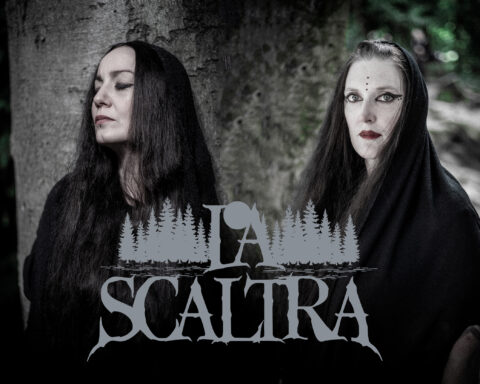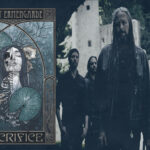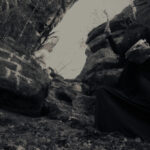[german version – english below]
„Das Offensichtliche liegt mir nicht“ Ashley Dayour im Interview zur neuen WHISPERS IN THE SHADOW Platte
Der Himmel ist wolkenverhangen und die überraschend warme Luft riecht nach verwesenden Blättern. Vereinzelt sieht man ein paar verkleidete Kinder auf den Straßen, aber im Jahr 2020 sind zum heutigen Halloween alle Menschen maskiert. Ich bin mit Ashley Dayour, Frontman und Mastermind von WHISPERS IN THE SHADOW, im weiträumigen Altwiener Cafè Schopenhauer zum Interview verabredet. Die Veröffentlichung des 10. Studioalbums YESTERDAY IS FOREVER steht unmittelbar bevor und ich habe einige Fragen. Wir lassen uns auf einer bequemen rot-beige-gestreiften Sitzgruppe nieder und ich lege die frisch gepresste CD zwischen uns auf den Tisch. Bei Cappuccino und Mohnkuchen kommen wir gleich zur Sache.
Ashley, YESTERDAY IS FOREVER. Ernsthaft?
Ich habe ganz bewusst einen Titel gewählt, den man auf verschiedene Art und Weise deuten kann. Ist das so zu verstehen wie es dasteht? Oder doch zynisch/zweideutig gemeint? Oder schwingt hier am Ende sogar eine Prise Humor mit? Ich denke, wenn man sich etwas eingehender mit den Texten und deren Darbietung befasst, wird relativ schnell klar, wie ich das meine.
Es handelt sich um euer 10. Studioalbum im 24-jährigen Bandbestehen. Wird es mit den Jahren leichter oder schwerer ein neues Album zu schreiben?
Ohne jetzt jammern zu wollen, aber es wird eindeutig schwerer. Vor allem dann, wenn man sich, wie ich, immer weiterentwickeln möchte. Vieles wurde schon gesagt, viele Ideen schon verwendet. Allerdings, sobald mal eine Linie und eine Idee da ist, wenn ich weiß, wohin die Reise gehen soll und wie ich ans Ziel komme, sprich Instrumentierung, Themen, Stimmungen etc. klar sind, geht es relativ schnell. Dann dauert es nur ca. 3 Monate bis ein Album steht. Der Weg bis dahin kann etwas länger dauern und mühsam sein. Ich werfe sehr viel Material weg mit dem ich nicht zufrieden bin oder dass nicht so klingt, wie ich mir das vorgestellt habe. Das ist der schwierige Teil.
Wie geht ihr die Arbeit an einem neuen Album an? Gibt es vorher einen konkreten Plan oder arbeitet ihr einfach drauflos?
Meistens gibt es in etwa einen Plan, was ich sagen will, welche Stimmungen wir erzeugen wollen und in etwa welche Themen wir behandeln. Ich würde nicht so weit gehen und jedes Album von uns als richtiges Konzept-Album bezeichnen, aber es geht in diese Richtung.
Einfach nur wild drauflos musizieren, das liegt mir überhaupt nicht. Die Vergangenheit hat auch gezeigt, genau diese Songs sind unsere schlechtesten.
Welchen Song auf dem Album hast du zuerst geschrieben, welchen zuletzt?
Der erste, der es auf das Album geschafft hat, ist interessanterweise auch der erste auf dem Album: FOREVER 1985. Er nimmt viele der Themen vorweg. Das kommt bei mir immer wieder vor, dass der Opener eines Albums fast schon so was wie eine thematische Inhaltsangabe ist. Lustigerweise passiert das ganz von selbst, da denke ich gar nicht groß drüber nach. Die letzten beiden Songs, die fertig wurden, waren THE WAR THAT NEVER WAS und STRAIGHT & NARROW, beides also etwas experimentierfreudigere Stücke die dem doch sehr melodiösen und zugänglichen Album den nötigen Twist geben.
Im Video zu WALK ON THE MIRROR schleifst du anfangs deine E-Gitarre hinter dir her und bindest sie an einem Baum fest, um anschließend mit der Akustikgitarre zu performen. Für mich ein Bild, das exemplarisch für das gesamte Album steht, da sich die Klänge der Akustikgitarre wie ein roter Faden durchs Album ziehen. Wie kam es dazu, dass du die E-Gitarre eingetauscht hast?
Ich habe einfach klangliche Ausdrucksweisen gesucht, die wir im Band eigenen Kosmos noch nicht oder nur sehr wenig hatten. Und natürlich gibt es auf dem Album auch E-Gitarren zu hören, allerdings nur in der Funktion als Lead Gitarre. Verzerrte Heavy Power Chords sucht man vergeblich.
Nach dem sehr lärmigen und punkigen THE URGENCY OF NOW, also dem Album davor, erschien mir das, wie der nächste logische Schritt. Ursprünglich wollte ich den Sound der letzten Platte ja sogar beibehalten, da ich das Gefühl hatte, da ist noch nicht alles gesagt. Nach den ersten Songideen, die diese Richtung weiterverfolgten, wurde mir jedoch ganz schnell ganz schön langweilig.
Neben der Akustikgitarre ist THE WAR THAT NEVER WAS die größte Überraschung auf dem Album. Marching Whispers, ein Trommelwahnsinn begleitet von Flötenklängen und Anti-Kriegsgesang. War es an der Zeit für einen Whispers-Protestsong, oder was steckt dahinter?
Der Song erzählt eine Geschichte. Zwei Armeen ziehen aus, um Krieg zu spielen, treffen sich aber aus Gründen nie, kehren wieder nach Hause zurück und sind ohne Krieg glücklicher.
Inspiriert wurde ich von Regisseur Werner Herzog, der hatte diese Idee für eine Kurzgeschichte, die er dann aber nie geschrieben hat. Ich fand das als Ausgangspunkt sehr spannend, weil es die Unsinnigkeit und das Absurde von Krieg sehr gut veranschaulicht. Die musikalische Umsetzung lag dann natürlich auf der Hand. In dem Fall war der Text schon vor der Musik fertig, was bei mir sehr selten der Fall ist.
Neben diesem fast schon exotischen Ausreißer, der auf so gut wie jedem Whispers-Album zu finden ist und damit schon Tradition hat, gibt es natürlich jede Menge klassische Whispers Gothic-Rock-Songs. THE I IN THE VOID möchte ich da als besonders gelungen hervorheben. Wie wichtig ist es dir, dass Whispers bei aller Veränderung und Entwicklung auch immer noch als Whispers erkennbar sind?
as stimmt wohl, es gibt auf vielen unserer Alben diesen einen Song, diesen „Was ist denn jetzt los?“-Moment. Ich mag so was. Genau dann, wenn man denkt: „Okay, jetzt habe ich es verstanden“, kommt so was um die Ecke. Ich denke, dass wir uns mit manchen Songs und Themen schon sehr weit aus dem Fenster lehnen, aber unser Publikum ist clever genug, um zu verstehen worum es dieser Band von Anfang ging. Zu Whispers wird die Musik meist ohnehin erst im Studio, wenn alle dazu beigetragen haben. Meine Demos klingen oft noch weiter entfernt von „unserem“ Sound. Ich bin, bei aller Veränderungswut, dann doch immer recht froh, wenn der Punkt kommt und man sehr eindeutig diese Band erkennt. Es ist ja jetzt auch nicht so, dass wir plötzlich Free Jazz machen würden. Wir schlagen zwar schon den einen oder anderen Haken, ich finde aber, dass es immer diese Band geblieben ist. Dazu trägt alleine schon meine Stimme bei. Die ist sehr limitiert. Was Fluch und Segen zugleich ist.
Beim Anhören des Albums bekommt man das Gefühl, dass einige Textzeilen durchaus ironisch gemeint sind und wenn man sich deine Performance im Video zu FOREVER 1985 ansieht, verstärkt sich dieser Eindruck noch. Hast du keine Angst, dass das Publikum die Ironie möglicherweise nicht versteht?
Nein, das wäre ja nur die Hälfte des Spaßes. Ich denke aber, der Text ist doch relativ eindeutig. Wenn das jemand nun noch immer nicht versteht, dann finde ich so viel Naivität schon fast wieder süß und dann soll das so sein.
Nostalgie bzw. die rigorose Ablehnung von Nostalgie sind Themen auf dem Album. Gibt es Situationen oder Themen, die Nostalgie oder Sentimentalität in dir auslösen?
Gerüche mehr als alles andere. Wenn ich mir ganz alte Songs anhöre, dann vielleicht auch, was ich aber kaum mache. Die meisten meiner Lieblingsthemen und Musiken habe ich ohnehin ständig um mich, die sind mit mir gewachsen. Daher wirkt das nicht nostalgisch auf mich. Das Aufwärmen alter, nur rückblickend lustiger, Geschichten vielleicht auch, aber niemals kommt mir der Gedanke, dass ich mich in diese alte Zeit zurücksehne. Ich bin ganz froh, dass das alles in der Vergangenheit liegt. Was wohl auch daran liegt das ich mich im Hier und Jetzt sehr wohl fühle. Das war aber nicht immer so.
Also diese alten, lustigen Geschichten würden mich nach dem Interview noch brennend interessieren. Statt einer Hinwendung zur Vergangenheit plädierst du dafür, der Zukunft offen und furchtlos entgegen zu treten. Das verlangt einen gewissen Optimismus. Ist Whispers eine optimistische Band?
Das ist tatsächlich eine sehr gute Frage und erfordert eine etwas längere Antwort.
Auf jeden Fall sind wir eine furchtlose Band. Das klingt, wenn ich das so sage, sicherlich etwas großspurig, aber wenn man sich unsere Karriere ansieht, ist das wirklich so. Wir haben immer gemacht, was wir wollten, auf Teufel komm raus. Wenn ich auf etwas stolz bin, dann auf das. Manchmal waren wir dabei auch richtig gut, manchmal nicht so ganz und manches hat auch künstlerisch nicht so funktioniert wie es hätte sollen. Das ist eben das Risiko. Aber sind wir wegen der Furchtlosigkeit auch eine optimistische Band? Ich glaube, das kommt auf die Phase drauf an. Anfangs sicherlich nicht, aber da waren wir ja alle noch fast Teenager und suhlten uns im Weltschmerz, wie sich das für eine Grufti-Band bestehend aus Anfang 20ern gehört. Es wäre etwas seltsam, wenn ich heute auch noch so denken und so drauf sein würde. Da wäre wirklich was falsch gelaufen. Vielleicht wurden wir mit unserer Okkult-Phase, also so ab 2008 sogar wirklich so was wie eine optimistische Band, weil ja diese Reise durch sämtliche okkulte Lehren und Themen genau darauf abzielt. Wenn man Okkultismus ernst nimmt und ihn nicht nur als Aufwertung oder aus Imagegründen verwendet, wird schnell klar, dass trotz aller Schattenarbeit und Düsternis der Weg selbst ein optimistischer ist. Am Ende geht es um Transzendenz und Progression.
Es mag Leute geben, die den, nennen wir ihn „okkulten Weg“ mit Nihilismus verwechseln, das ist aber nur dann so, wenn man stecken bleibt. Meines Erachtens. Ich würde also sagen, wir sind eine optimistische Band geworden, weil wir als Menschen und auch als Künstler gewachsen sind. Das bedeutet aber nicht, dass wir nur noch Drei-Minuten-Pop-Songs schreiben oder uns allem Negativen verwehren. Ganz im Gegenteil. Es ist aber ein Unterschied, ob man sich im selbstmitleidigen Weltschmerz suhlt, oder diesen erkennt und daraus etwas Neues schafft.
Dem Pressetext habe ich entnommen, dass die Texte diesmal im „Stream of Consciousness“ entstanden sind, wie kann man sich das konkret vorstellen?
Das war nur bei zwei Songs so, und zwar STRAIGHT & NARROW und THE HORROR. Ich habe das auch früher schon gemacht, allerdings jetzt schon sehr lange nicht mehr. Ich setzte mich hin, lasse den Song auf mich wirken und schreibe einfach drauflos, egal ob die Zeilen Sinn ergeben oder zusammenpassen. Und da kam diesmal bei STRAIGHT & NARROW auch dieser deutsche Satz: „Was für ein Spaß!“ aus mir heraus. Ich habe keine Ahnung, was das alles bedeutet.
Das heißt du warst selbst von den Texten, die so entstanden sind, überrascht?
Bei manchen Passagen stellte sich heraus, dass sie wohl von Träumen, die ich kurz davor hatte, inspiriert wurden. Was ja auch Sinn macht, wenn man dem Unbewussten die Kontrolle übergibt. Das Meiste bleibt wohl für immer verschlüsselt bzw. es gibt verschiedenste Interpretationsmöglichkeiten, nicht nur für die Hörer, auch für mich. Also genau das Gegenteil von einem Text wie eben A WAR THAT NEVER WAS, der sehr statisch ist und eine Geschichte erzählt. Ich finde beides sehr spannend und wie auch bei der Musik sind wir auf diesem Album auch hier sehr divers unterwegs und decken ein großes Spektrum ab.
Vor der Veröffentlichung habt ihr zwei Songs als Singles ausgekoppelt: FOREVER 1985 und WALK ON THE MIRROR. Zwei sehr unterschiedliche Songs. Nach welchen Kriterien wählt ihr die Singles aus?
Natürlich sind es oft die eingängigen Stücke, die man dazu auswählt, allerdings auch nicht immer, wie die Vergangenheit gezeigt hat. Wenn man etwa BLOOD, SWEAT AND TEARS (Anmerkung: vom Album THE ETERNAL ARCANE) oder THE RITES OF PASSAGE (Anmerkung, vom gleichnamigen Album THE RITES OF PASSAGE) hernimmt. Das waren sicherlich nicht die offensichtlichsten Kandidaten für Videoclips. Auch wichtig ist, dass Edie Calie, ihres Zeichens für alle WHISPERS IN THE SHADOW Videoclips verantwortlich, etwas mit den betreffenden Songs anfangen kann und sie die Songs und Themen der jeweiligen Stücke zu Ideen inspirieren. Diese entstehen dann in einer engen gemeinschaftlichen Arbeit. Vieles davon sehr spontan und intuitiv. Das ist ein sehr befreites kreatives Arbeiten, wo vieles aus dem Moment heraus entsteht, mit den Mitteln die wir haben oder auch erst vor Ort auffinden. Ich schätze das sehr.
Kannst du etwas zu den Videos und deren Entstehung erzählen?
FOREVER 1985 ist ein Performance Video der etwas anderen Art. Jedes Bandmitglied ist für sich alleine abgeschottet von den anderen. Im Nachhinein erstaunlich wie sehr wir da dem Zeitgeist der Isolation entsprechen. WALK ON THE MIRROR geht einen völlig anderen Weg, ist teils gemeinsame Bandperformance, teils ein Spaziergang mit mir durch den „Perfumed Garden“. Wir wollten einen sehr psychedelischen Clip drehen, der die entrückt romantische Stimmung des Songs einfängt. Ich finde dieser Trip ist uns sehr gut gelungen. Ich und auch alle anderen in der Band halten den Clip für unser bestes Video. ADRIFT, das finale Video von YESTERDAY IS FOREVER, wird gerade in diesem Moment fertiggestellt und ist die direkte Fortsetzung von WALK ON THE MIRROR. Das Erwachen nach dem Spaziergang/Trip/Traum und das Zusammentreffen mit dem schon besiegt geglaubten übermächtigen Ego im „Grand Hotel Abyss“, das auch in den Lyrics Erwähnung findet. Der Endgegner sozusagen.
Mir ist wichtig, dass Videos mit ihren Ideen unterhalten und zumindest in Teilen eine Geschichte erzählen. Das ist etwas, was mir heutzutage bei so vielen Clips fehlt. Da geht es nur darum ein Image zu präsentieren. Da wird mir beim Anschauen meistens sehr schnell langweilig. Und nein, man braucht nicht immer ein riesen Budget, man braucht Ideen und ein wenig Mut. Ich finde es gerade bei Videos interessant, mit dem Image auch mal ganz bewusst zu brechen, in die Rollen zu schlüpfen, die die Songs eben aufdrängen. Im Idealfall ist ein Video mehr als ein Promo Tool. Ich denke, dass ist uns diesmal ganz gut gelungen.
Es gibt ein Thema, auf das ich ehrlich gesagt ungern zu sprechen komme, weil ich Szene-Diskussionen müßig und für alle über 25 infantil finde. Trotzdem habe ich das Gefühl, dass ich den schwarzen Elefanten im Raum ignoriere, wenn ich es nicht anspreche. So here we go: In Textzeilen wie „Give me a passion project. Another old-school song. Another reason to make you listen. To the same tune. On and on”, und “A better scene. A better sound. A truer, a darker underground”, höre ich so was wie Szene-Kritik raus. Höre ich richtig? Oder handelt es sich um eine Form der Selbstkritik, da ihr selbst seit 24 Jahren fester Bestandteil der Gothic-Szene seid?
Beides. Es ist halt ein Jammer, wie sehr die Szene seit vielen Jahren auf der Stelle tritt. Wirklich spannende düstere Musik wird ja meines Erachtens mittlerweile woanders gemacht. Es ist erstaunlich, wie wenig diese Szene an Progression und Weiterentwicklung interessiert ist und wie konservativ alles geworden ist. Gerade wenn man bedenkt, woher das alles gekommen ist. Wobei sich hier die Katze in den Schwanz beißt, weil das kann man jetzt wieder als „Früher war alles besser“ verstehen. Und das ist wohl der Satz, den dir jeder Grufti nach 10 Minuten ungefragt um die Ohren hauen wird. Ich sehe mich als Teil des Problems, ja. Ich bin mir aber dessen bewusst. Das wir uns da etwas aus dem Fenster lehnen ist klar, aber ich konnte diese ewige Selbstbeweihräucherung à la „Wir sind wir“ nur mehr schwer ertragen und als alter Punk kann ich natürlich nur schwer meinen Mund halten. Mag sein, dass uns das die eine oder der andere jetzt übel nimmt, aber in den Tiefen ihrer pechschwarzen Herzen wissen sie natürlich, dass das alles stimmt. Ich bin selbst erstaunt, dass sich diesem Thema noch niemand angenommen hat. Aber an Kritik ist ja nur derjenige interessiert, der sich mit dem Satus Quo nicht zufriedengibt.
Die Gothic-Szene befindet sich im Spannungsfeld zwischen Vergangenheitszuwendung, -romantisierung (Stichwörter: Viktorianische Zeit, klassische Literatur von Edgar Allan Poe und Baudelaire) und Punkwurzeln. Wo würdest du Whispers da verorten?
Ich wurde sagen irgendwie beides. Ich habe eine große Vorliebe für diese Romantik-Epoche.
Man sollte sie nur nicht zu ernst nehmen, weil natürlich waren diese Leute Kinder ihrer Zeit.
Das Punkige, Aufwieglerische war bei Whispers von Anfang an vorhanden. Mal mehr mal weniger. Vielleicht sind wir also eine Band die dieser Vergangenheitszuwendung mit einem Punk-Ethos begegnet? Das könnte es ganz gut treffen
Aber würde der von euch besungene Nostalgie-Hammer nicht einige Anhänger/innen der Schwarzen Szene in eine ernsthafte Identitätskrise stürzen?
Es muss ja nicht gleiche eine Identitätskrise sein, aber vielleicht ein kurzes Nachdenken. Und ein in Frage stellen, ob dieses „aber wir sind wir“ oder „wir sind, was wir sind“ wirklich die Antwort sein kann.
Kommen wir zum Schluss noch auf das bestimmende Thema dieser Zeit zu sprechen. Während wir hier sitzen und reden, verkündet die Österreichische Regierung gerade den zweiten Lock Down ab nächster Woche. Welchen Einfluss hat die Pandemie auf deine Kreativität? Gesellschaftlich existiert das Bild, dass Künstler/innen Krisen als Input ihrer Kunst verwenden und in gewisser Weise sogar brauchen, wie ist das bei dir?
Ich finde das Bild des leidenden Künstlers ist eines der dümmsten und falschesten Klischees überhaupt. Auch hier glaube ich das sowas in jüngeren Jahren vielleicht zutreffen kann, da man ganz bewusst damit spielt und es dieses Adoleszente ja auch sehr fördert. Aber wenn du dir Interviews von kreativen Menschen, die das seit vielen Jahren machen, ansiehst, dann stellt sich schnell heraus, dass jeder irgendwann erkannt hat, dass das Unsinn ist. Wenn man zum Beispiel wirklich arge Depressionen hat, dann kann man nicht mal das Bett verlassen, geschweige denn konzentriert an einem Stück arbeiten. Ich finde es an der Zeit, endlich Schluss mit diesen Klischees zu machen. Gerade im Musik-Bereich leiden viele Leute an psychischen Erkrankungen, aufgrund der oft prekären Arbeitssituation kein Wunder. Suizid ist in diesem Bereich alarmierend hoch. Man fängt gerade erst an, das auch anzusprechen und es findet endlich Öffentlichkeitsarbeit dazu statt. Der Irrglauben, dass das halt zum Musiker/Künstler Dasein dazu gehört, muss endlich aufhören. Es ist nichts Romantisches daran.
Natürlich wird die Pandemie auf alles Einfluss nehmen und Auswirkungen haben, aber ich sehe das eher auf einer logistischen, wirtschaftlichen Ebene als auf einer künstlerischen.
Also ist von dir auch in Zukunft keine Corona Kunst zu erwarten?
Offensichtliche „Corona Kunst“ in dem Sinn nicht. Das Offensichtliche liegt mir nicht.
Wie gehst du privat mit dieser aktuellen Unsicherheit um? Irgendwelche Tipps?
Bisher sehr gut, Unsicherheit ist für einen Musiker kein Fremdwort, sondern eher so was wie der Normalzustand. Damit komme ich gut zurecht. Ich habe mich von Anfang an darauf eingestellt, dass das alles mitunter richtig lange dauern wird. Ich übe mich in Geduld und Demut und versuche in dem ganzen Wahnsinn der zurzeit abgeht – Corona ist ja nur ein Teil davon – einen halbwegs klaren Kopf zu bewahren. Ich bin in der glücklichen Lage, dass meine Lebenssituation eine sehr gute ist, was Wohnung und das Zusammenleben angehen. Den Lockdown, dieses Runterfahren im Frühjahr, habe ich sogar sehr genossen, und ich habe mit vielen Menschen gesprochen, die das genauso empfanden. Vor allem, dass dieser ewige Wettbewerb für ein paar Wochen mal ein Ende gefunden hat war eine schöne Erfahrung. Aber natürlich ist mir vollkommen klar, dass es Menschen gibt, die nicht in so einer glücklichen Lage sind wie ich. Und ich denke, die wirklich schwierige Zeit, die wird erst kommen. Die Auswirkungen werden noch viele Jahre spürbar sein. Da sollte man sich geistig darauf einstellen, dass das was bis jetzt passiert ist, noch relativ harmlos war. Die Rechnungen für das alles, werden wir erst noch bezahlen müssen. Das wird mitunter richtig ungemütlich. Aber auch das wird vergehen.
Klingt nach einem relativ pessimistischen Schlusswort. Ich dachte, du bist Optimist?
Zweckoptimist bin ich dann doch nicht. Es wäre schon etwas naiv zu glauben, dass das alles schnell wieder vorbei ist und es keinerlei Langzeitfolgen haben wird. In vielerlei Hinsicht. Die Zukunft ist wohl so ungewiss wie schon lange nicht mehr, das ist aber für mich nicht unbedingt nur negativ.
Von draußen drängt mittlerweile schwarze Nacht gegen die Fenster des Cafè Schopenhauer. Die Kaffeeränder an unseren Tassen sind längst eingetrocknet, auf unseren Tellern liegen nur noch Krümel und an den umliegenden Tischen wird Schnaps zum Wein bestellt. Auch mich überkommt die Lust auf ein Gläschen Weißwein. Vielleicht entlocke ich Ashley ja noch die ein oder andere nostalgische Geschichte. Zum Beispiel aus den 2000er Jahren, in denen er Solar Lodge Labelgründer Artaud Seth kennenlernte und WHISPERS IN THE SHADOW zusammen mit GARDEN OF DELIGHT tourten.
YESTERDAY IS FOREVER ist das vierte Album, das auf Solar Lodge rauskommt und ab sofort erhältlich ist.
[english version – german above]
„The obvious is not my thing“ – Ashley Dayour in an interview about the new WHISPERS IN THE SHADOW record.
The sky is overcast, and the surprisingly warm air smells of decaying leaves. Occasionally, you see a few costumed children on the streets, but in 2020, everyone is masked for Halloween. I’m meeting Ashley Dayour, frontman and mastermind of WHISPERS IN THE SHADOW, for an interview at the spacious Café Schopenhauer in old Vienna. The release of the 10th studio album, YESTERDAY IS FOREVER, is imminent, and I have some questions. We settle into a comfortable red-beige striped seating area, and I place the freshly pressed CD on the table between us. Over cappuccino and poppy seed cake, we get straight to the point.
Ashley, YESTERDAY IS FOREVER. Seriously?
I deliberately chose a title that can be interpreted in various ways. Should it be understood as it stands? Or is it meant to be cynical or ambiguous? Or does it even carry a hint of humor in the end? I think if one delves deeper into the lyrics and their delivery, it becomes quite clear what I mean.
This is your 10th studio album in the band’s 24-year history. Does it get easier or harder to write a new album over the years?
Without wanting to complain, it definitely gets harder. Especially when, like me, you want to keep evolving. Much has already been said, many ideas have been used. However, once a direction and an idea are set, when I know where the journey should go and how to get there—meaning instrumentation, themes, moods, etc., are clear—it goes relatively quickly. Then it takes only about 3 months for an album to be completed. The path to get there can take a bit longer and be cumbersome. I discard a lot of material that I’m not satisfied with or that doesn’t sound the way I envisioned. That’s the difficult part.
How do you approach work on a new album? Do you have a concrete plan beforehand, or do you just start working?
Usually, there’s roughly a plan about what I want to say, what moods we want to create, and roughly what themes we want to address. I wouldn’t go so far as to call each of our albums a concept album, but it leans in that direction. Just making music wildly without direction doesn’t suit me at all. The past has also shown that those songs are usually our worst.
Which song on the album did you write first, and which last?
Interestingly, the first one that made it onto the album is also the first one on the album: FOREVER 1985. It anticipates many of the themes. This often happens to me, where the opener of an album almost serves as a thematic synopsis. Funny enough, this happens automatically; I don’t really think about it much. The last two songs that were finished were THE WAR THAT NEVER WAS and STRAIGHT & NARROW, both somewhat more experimental pieces that give the very melodic and accessible album the necessary twist.
In the video for WALK ON THE MIRROR, you initially drag your electric guitar behind you and tie it to a tree, then proceed to perform with an acoustic guitar. For me, this image is exemplary of the entire album, as the sounds of the acoustic guitar thread through the album like a red thread. How did you decide to switch to the acoustic guitar?
I was simply looking for tonal expressions that we hadn’t or only minimally explored within our band’s own cosmos. And of course, there are electric guitars on the album too, but only in the role of lead guitar. Distorted heavy power chords are searched for in vain. After the very noisy and punky THE URGENCY OF NOW, the previous album, it seemed to me like the next logical step. Originally, I even wanted to maintain the sound of the last record, as I felt that not everything had been said yet. After the initial song ideas that continued in this direction, I quickly got quite bored.
In addition to the acoustic guitar, THE WAR THAT NEVER WAS is the biggest surprise on the album. Marching Whispers, a drum madness accompanied by flute sounds and anti-war singing. Was it time for a Whispers protest song, or what’s behind it?
The song tells a story. Two armies set out to play war but for reasons never meet, return home, and are happier without war. I was inspired by director Werner Herzog, who had this idea for a short story but never wrote it. I found this starting point very exciting because it illustrates the absurdity and absurdity of war very well. The musical implementation was then obvious. In this case, the lyrics were finished before the music, which is very rare for me.
In addition to this almost exotic outlier, which can be found on almost every Whispers album and thus already has a tradition, there are, of course, plenty of classic Whispers gothic rock songs. I would like to highlight THE I IN THE VOID as particularly successful. How important is it to you that Whispers remains recognizable as Whispers despite all the changes and developments?
That’s true; there is that one song on many of our albums, that „What’s going on here?“ moment. I like that. Just when you think, „Okay, now I get it,“ something like that comes around. I think with some songs and themes, we stretch ourselves very far, but our audience is clever enough to understand what this band has been about from the beginning. The music usually only becomes Whispers in the studio when everyone has contributed. My demos often sound even further from „our“ sound. Despite all the craving for change, I’m usually quite relieved when the point comes and this band is very clearly recognizable. It’s not like we suddenly make free jazz. We do take the odd detour, but I think it has always remained this band. My voice alone contributes to that. It’s very limited, which is both a curse and a blessing.
Listening to the album gives you the feeling that some lyrics are quite ironic, and watching your performance in the FOREVER 1985 video strengthens this impression. Aren’t you afraid that the audience might not understand the irony?
No, that would only be half the fun. But I think the lyrics are relatively clear. If someone still doesn’t understand that, I find so much naivety almost sweet and then it should be like that.
Nostalgia or the rigorous rejection of nostalgia are themes on the album. Are there situations or themes that trigger nostalgia or sentimentality in you?
Smells more than anything else. If I listen to very old songs, maybe that too, but I hardly do. Most of my favorite themes and music I have around me constantly; they have grown with me. So, it doesn’t seem nostalgic to me. Warming up old, only retrospectively funny stories perhaps, but never do I think that I long for those old times. I’m quite glad that’s all in the past. This is probably also because I feel very comfortable in the here and now. But it wasn’t always like that.
So, these old, funny stories would interest me a lot after the interview. Instead of turning to the past, you advocate facing the future openly and fearlessly. That requires a certain optimism. Is Whispers an optimistic band?
That’s actually a very good question and requires a slightly longer answer. We are definitely a fearless band. That might sound a bit grand when I say that, but if you look at our career, it’s true. We’ve always done what we wanted, hell or high water. If I’m proud of anything, it’s that. Sometimes we were really good at it, sometimes not so much, and sometimes artistically it didn’t work out as it should have. That’s the risk. But are we an optimistic band because of our fearlessness? I think it depends on the phase. Initially, certainly not, but then we were all still teenagers and wallowed in world-weariness, as is appropriate for a goth band consisting of early 20-somethings. It would be strange if I still thought that way and was like that today. Something would have gone wrong. Perhaps with our occult phase, starting around 2008, we actually became something like an optimistic band because this journey through all occult teachings and themes aims exactly at that. If you take occultism seriously and don’t just use it for enhancement or image reasons, it quickly becomes clear that despite all the shadow work and darkness, the path itself is an optimistic one. In the end, it’s about transcendence and progression.
There may be people who confuse this „occult path“ with nihilism, but that’s only if you get stuck. In my opinion. So, I would say we’ve become an optimistic band because we’ve grown as people and as artists. But that doesn’t mean we only write three-minute pop songs or shy away from all the negative. On the contrary, there is a difference between wallowing in self-pitying world-weariness and recognizing it and creating something new from it.
I read in the press release that the lyrics were written this time in a „stream of consciousness.“ How can one imagine this concretely?
That was only the case with two songs, STRAIGHT & NARROW and THE HORROR. I’ve done this before, but not for a long time now. I sit down, let the song affect me, and just write away, regardless of whether the lines make sense or fit together. This time, with STRAIGHT & NARROW, the German sentence „Was für ein Spaß!“ („What fun!“) even came out of me. I have no idea what all that means.
So, you were surprised yourself by the lyrics that came about like this?
At some points, it turned out that they were probably inspired by dreams I had just before. Which makes sense if you give control to the unconscious. Most of it will probably remain encrypted forever, or there are various interpretation possibilities, not only for the listeners, but also for me. So, exactly the opposite of a text like A WAR THAT NEVER WAS, which is very static and tells a story. I find both very exciting, and as with the music, we are also very diverse on this album and cover a wide spectrum here.
Before the release, you released two songs as singles: FOREVER 1985 and WALK ON THE MIRROR. Two very different songs. According to what criteria do you choose the singles?
Of course, it’s often the catchy pieces that you choose for that, but not always, as history has shown. If you take BLOOD, SWEAT AND TEARS (Note: from the album THE ETERNAL ARCANE) or THE RITES OF PASSAGE (Note, from the eponymous album THE RITES OF PASSAGE), for example. These were certainly not the most obvious candidates for video clips. Also important is that Edie Calie, responsible for all WHISPERS IN THE SHADOW video clips, can do something with the songs in question and they inspire ideas for the songs and themes of the respective pieces. These then arise in close collaboration. Much of it is very spontaneous and intuitive. This is a very liberated creative process where much arises from the moment, with the means we have or even just find on site. I appreciate that very much.
Can you tell us something about the videos and their creation?
FOREVER 1985 is a performance video of a somewhat different kind. Each band member is isolated from the others. In hindsight, it’s amazing how much we corresponded to the zeitgeist of isolation there. WALK ON THE MIRROR takes a completely different approach, partly a joint band performance, partly a walk with me through the „Perfumed Garden.“ We wanted to shoot a very psychedelic clip that captures the ethereal romantic mood of the song. I think we succeeded very well with this trip. I and everyone else in the band consider the clip to be our best video. ADRIFT, the final video from YESTERDAY IS FOREVER, is currently being completed and is the direct continuation of WALK ON THE MIRROR. The awakening after the walk/trip/dream and the encounter with the seemingly defeated but still overpowering ego in the „Grand Hotel Abyss,“ which is also mentioned in the lyrics. The final boss, so to speak.
It’s important to me that videos entertain with their ideas and tell at least part of a story. This is something that I miss in so many clips nowadays. It’s often just about presenting an image. I usually get bored very quickly when watching them. And no, you don’t always need a huge budget; you need ideas and a little courage. I find it interesting, especially with videos, to consciously break with the image, to slip into the roles that the songs impose. Ideally, a video is more than just a promo tool. I think we managed that quite well this time.
There’s a topic I honestly don’t like to discuss because I find scene discussions tedious and infantile for anyone over 25. Still, I feel like I’m ignoring the black elephant in the room if I don’t address it. So here we go: In lyrics like „Give me a passion project. Another old-school song. Another reason to make you listen. To the same tune. On and on,“ and „A better scene. A better sound. A truer, a darker underground,“ I hear something like scene criticism. Am I hearing correctly? Or is it a form of self-criticism, since you yourselves have been an integral part of the gothic scene for 24 years?
Both. It’s just a pity how much the scene has been standing still for many years. Truly exciting dark music is now made elsewhere in my opinion. It’s astonishing how little interest this scene has in progression and development and how conservative everything has become. Especially when you consider where it all came from. Although this is where the cat bites its own tail, because this could now be understood as „everything was better in the past.“ And that’s probably the sentence that every Goth will hit you with after 10 minutes, unasked. I see myself as part of the problem, yes. But I’m aware of that. It’s clear that we’re sticking our necks out there, but I could hardly stand this eternal self-congratulation à la „We are who we are“ anymore, and as an old punk, I can hardly keep my mouth shut. It may be that some people take offense at this, but deep down in their pitch-black hearts, they know it’s all true. I’m surprised that no one has addressed this topic yet. But criticism only interests those who are not satisfied with the status quo.
The Gothic scene is caught between a focus on the past, romanticizing it (keywords: Victorian era, classic literature by Edgar Allan Poe and Baudelaire), and its punk roots. Where would you place Whispers in this context?
I would say somehow both. I have a great fondness for this Romantic era. One just shouldn’t take it too seriously, because of course, these people were children of their time. The punk, rebellious aspect has always been present in Whispers from the beginning. Sometimes more, sometimes less. So maybe we’re a band that encounters this focus on the past with a punk ethos? That could hit the nail on the head quite well.
But wouldn’t the nostalgia hammer sung by you throw some followers of the Gothic scene into a serious identity crisis?
It doesn’t have to cause an identity crisis, but maybe a moment of reflection. And questioning whether this „but we are who we are“ or „we are what we are“ can really be the answer.
Finally, let’s talk about the defining theme of this time. While we sit here and talk, the Austrian government is announcing the second lockdown from next week. What influence does the pandemic have on your creativity? Societally, there is the image that artists use crises as input for their art and even need them in a certain way, how is it with you?
I think the image of the suffering artist is one of the dumbest and most false clichés ever. I also believe that this may apply in younger years, as one consciously plays with it and adolescence promotes it. But if you look at interviews with creative people who have been doing this for many years, it quickly becomes clear that everyone has eventually realized that this is nonsense. If you really have severe depression, you can’t even get out of bed, let alone work on a piece concentratedly. I think it’s time to finally put an end to these clichés. Many people in the music industry suffer from mental illnesses precisely because of the often precarious work situation. Suicide rates in this area are alarmingly high. People are just starting to address this, and there is finally public awareness about it. The misconception that this is part of being a musician/artist must finally stop. There’s nothing romantic about it.
Of course, the pandemic will influence everything and have consequences, but I see this more on a logistical, economic level than on an artistic one.
So, in the future, we shouldn’t expect Corona art from you either?
Obvious „Corona art“ in that sense, no. The obvious doesn’t appeal to me.
How do you personally deal with this current uncertainty? Any tips?
So far, very well. Uncertainty is no stranger to a musician, but rather something like the normal state. I’ve been prepared from the beginning that all of this could take a really long time. I practice patience and humility and try to maintain a reasonably clear head amidst all the madness going on right now—Corona is just one part of it. I’m fortunate that my life situation regarding housing and living together is very good. I even enjoyed the lockdown, this slowdown in spring, and I’ve spoken to many people who felt the same way. Especially that this eternal competition found an end for a few weeks was a nice experience. But of course, I realize that there are people who are not in as fortunate a situation as I am. And I think the really difficult time is yet to come. The effects will be noticeable for many years. Mentally preparing for what has happened so far is still relatively harmless. We will have to pay the bills for all of this. That could get really uncomfortable at times. But even that will pass.
Sounds like a relatively pessimistic conclusion. I thought you were an optimist?
I’m not an unqualified optimist. It would be naive to believe that all of this will be over quickly and will have no long-term consequences. In many ways. The future is as uncertain as it has been in a long time, but that’s not necessarily only negative for me.
From outside, the black night is now pushing against the windows of Café Schopenhauer. The coffee stains on our cups have long since dried, there are only crumbs left on our plates, and schnapps is being ordered instead of wine at the surrounding tables. I’m also feeling the urge for a glass of white wine. Maybe I can still get Ashley to tell me a nostalgic story or two. For example, from the 2000s, when he met Solar Lodge label founder Artaud Seth and WHISPERS IN THE SHADOW toured together with GARDEN OF DELIGHT.
YESTERDAY IS FOREVER is the fourth album to be released on Solar Lodge and is now available.
